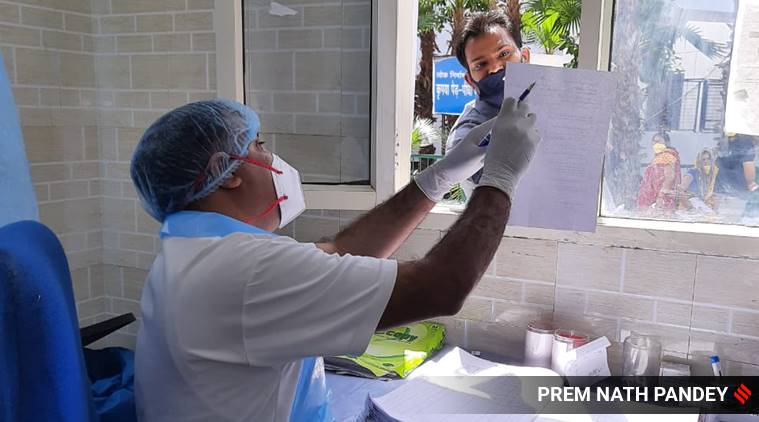 On those under PMJAY, the ICMR said they would get cashless testing in private labs on production of the cards.
On those under PMJAY, the ICMR said they would get cashless testing in private labs on production of the cards.
Modifying its April 8 order which made COVID-19 testing free in all private laboratories, the Supreme Court Monday said that the benefit will be available only to those covered under the Pradhan Mantri Jan Arogya Yojana (PMJAY), also known as Ayushman Bharat Yojana, and to other economically weaker sections as may be notified by the government.
A bench of Justices Ashok Bhushan and S Ravindra Bhat also asked the Ministry of Health and Family Welfare to “consider as to whether any other categories of the weaker sections of the society e.g. workers belonging to low income groups in the informal sectors, beneficiaries of Direct Benefit Transfer, etc. apart from those covered under Ayushman Bharat Pradhan Mantri Jan Arogya Yojana are also eligible for the benefit of free testing and issue appropriate guidelines in the above regard within a period of one week”.
It said the “private labs can continue to charge the payment for testing of COVID-19 from persons who are able to make payment of testing fee as fixed by ICMR (Indian Council of Medical Research)”.
The court asked the government to “issue necessary guidelines for reimbursement of cost of free testing of COVID-19 undertaken by private labs and necessary mechanism to defray expenses and reimbursement to the private labs”.
The bench directions came after it heard a plea by Delhi-based doctor Kaushal Kant Mishra who urged the court to modify its April 8 order. He said the court must allow private labs to conduct the test at the rate fixed by ICMR while making an exception to provide free testing for the EWS, the expenses of which should be reimbursed by the government.
Appearing for some private labs, Senior Advocate Mukul Rohatgi told the bench that ICMR had fixed Rs 4,500 on a moderate side to cover the expenses of the labs. He said that the labs were not charging anything from the labs to carry on the test if they are not allowed to charge PMJAY beneficiaries. The kits utilised in the test, he said, are imported and involve substantial expenses.
Appearing for the Centre, Solicitor General Tushar Mehta pointed out that under PMJAY, health coverage is provided to around 10.74 crore poor and vulnerable “families”, approximately 50 crore beneficiaries.
He said the country had limited resources and that the fight against COVID-19 may go on for some more time.
He submitted to the court an affidavit by the ICMR, urging the court to dismiss the petition since the poor were already covered by PMJAY.
On the decision to involve private labs, the affidavit stated that “when the country plans its strategy to fight an unknown pandemic, it is prudent to provide for more capacity than which may be required keeping the worst future scenario in mind. With a view to take care of such a situation, the Government of India decided to involve private laboratories (which should be and are NABL accredited laboratories)”.
It said the decision taken after “extensive deliberations in and with the National Task Force (headed by Vinod Paul, Member, NITI Aayog) on all aspects”.
From just one lab to test for COVID-19 in January, the capacity has now been “rapidly expanded” to 138 government laboratories, as on April 9, where both screening and confirmation tests can be conducted, it submitted.
The government, the affidavit stated, had also approved 67 laboratories along with their collection centres all over the country.
It stated that approximately 87.28 per cent testing till now had taken place in government laboratories and only 12.72 per cent has taken place in private laboratories.
On those under PMJAY, the ICMR said they would get cashless testing in private labs on production of the cards.
The ICMR also clarified on the Rs 4,500 cap fixed for COVID-19 tests in private labs. It said “private labs are not ‘permitted’ to charge Rs 4500 by the government. The said figure is mandated by the government to ensure that they do not charge more. Provision for Rs 1500 for screening and Rs 3000 for confirmative tests, if necessary, is by way of a mandatory ‘capping’ provided by the government so as to ensure that private laboratories do not charge more”.
After the April 8 order of the Supreme Court, private labs had called upon the government to “come up with modalities” so that their service “remains sustainable”.
Some of the leading labs said while they “endorse” the order, testing involves “fixed costs”, such as reagents and consumables. And in the case of COVID-19, they said, the labs have to incur the cost of providing personal protective equipment to their staff, too.